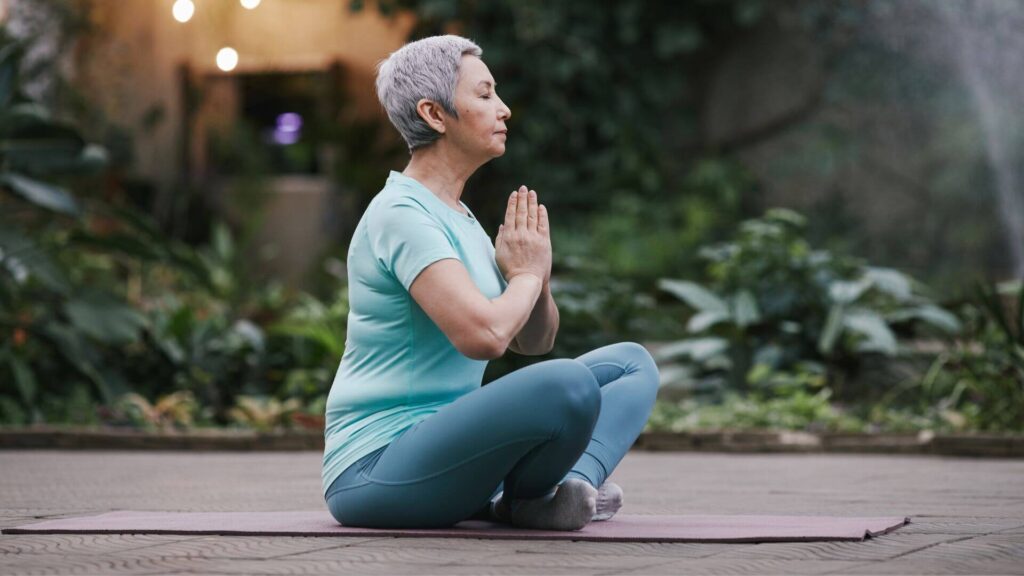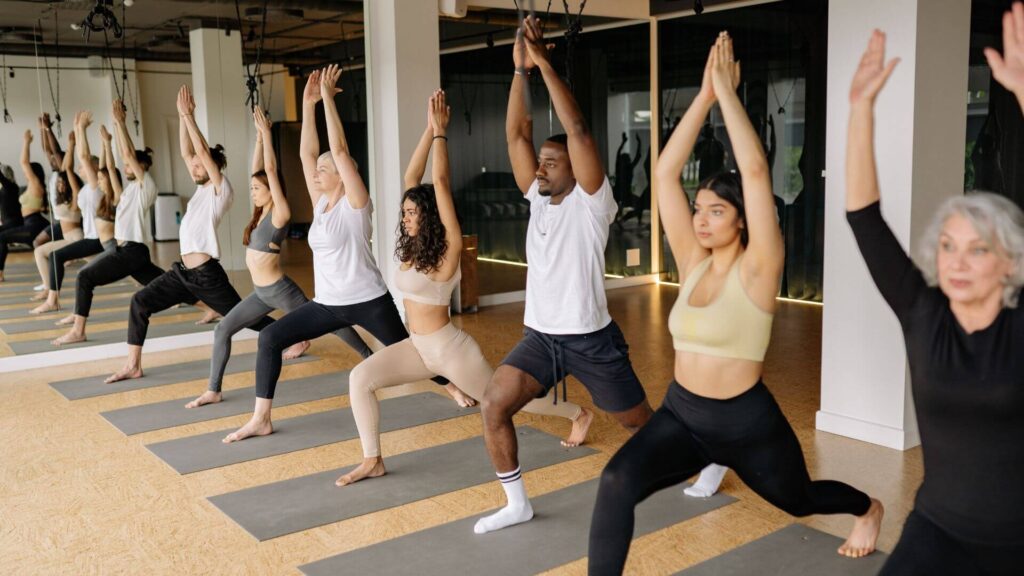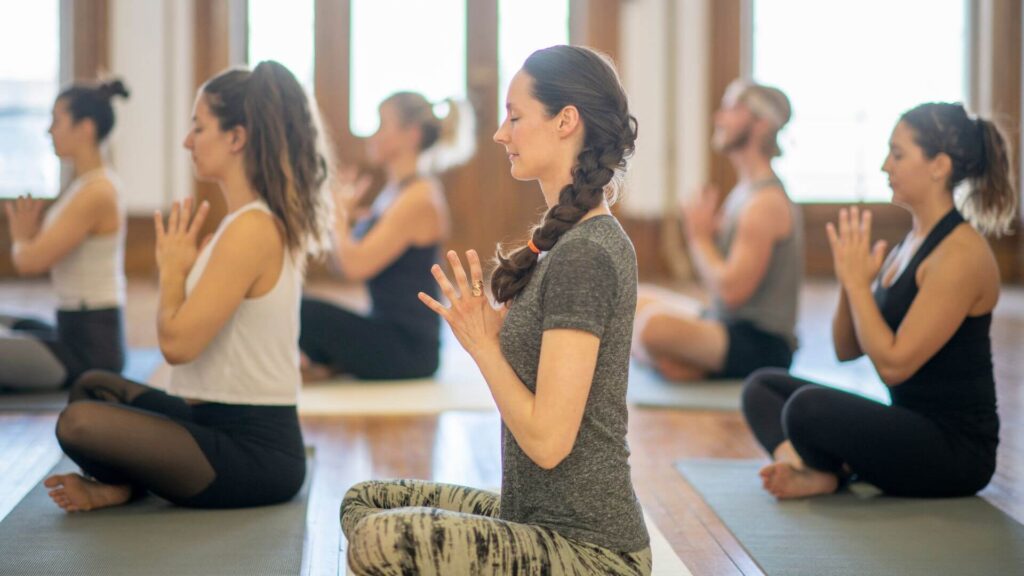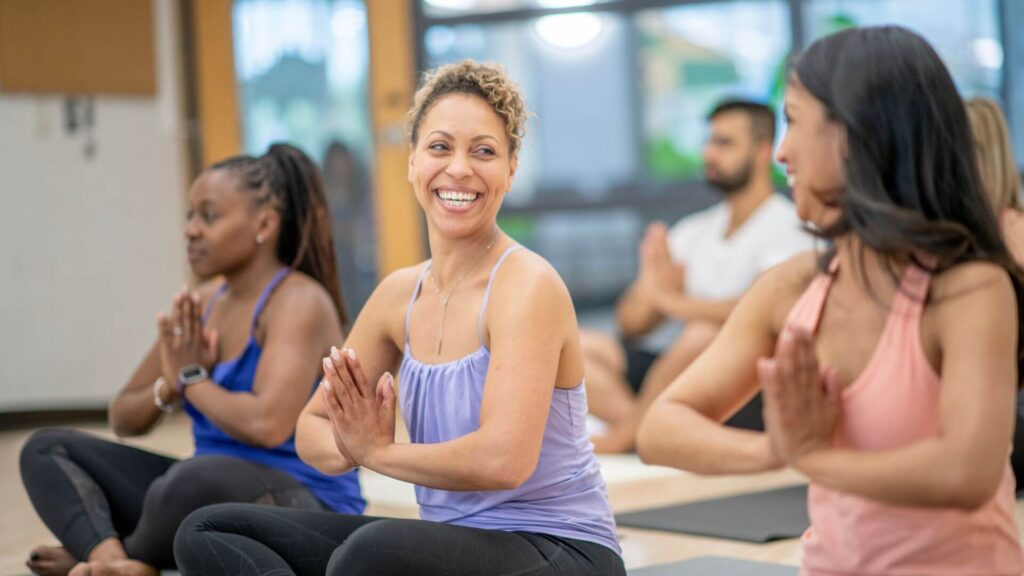What Are The Health Benefits Of Yoga And Why You Should Do It Daily
When you hear the word Yoga, you might think of a person in hip-hugging pants and a sports bra contorting their body into pretzel-like shapes. However, there is much more to Yoga than that.
Yoga is an ancient system of physical and mental exercises originating in India. The word “yoga” comes from the Sanskrit root yuj, which means “to yoke” or “to unite.” Thus, Yoga is often defined as the union of mind, body, and spirit.
Yoga has many different forms, but most classes involve flowing through postures (called asanas) while focusing on your breath. In addition to promoting physical health and wellbeing, Yoga can also help to reduce stress, improve mental clarity, better joint health, and increase your sense of inner peace.
Key Takeaways:
- Yoga epitomizes a union of mind, body, and spirit, transcending conventional perceptions.
- The term ‘yoga’ stems from Sanskrit, denoting an integration or alliance.
- Yoga encompasses myriad forms, typically characterized by seamless transitions between postures and conscious breathing techniques.
- Beyond its physical benefits, yoga offers a holistic approach to well-being, encompassing mental, emotional, and spiritual dimensions.
What Is Yoga?

Yoga is an ancient Indian practice that has become popular around the world. It involves a system of physical and mental exercises that can be used to improve health and wellbeing.
Yoga can provide many health benefits, including improving flexibility, strength, and endurance. It can also help to reduce stress, anxiety, and depression. Additionally, Yoga has been shown to improve heart health, increase energy levels, and improve sleep quality.
If you’re looking for a way to improve your overall health and wellbeing, then the daily practice of Yoga may be the perfect solution for you.
How Do I Start Doing Yoga?
Why You Should Practice Yoga Every Day. If you’re thinking about taking up Yoga, you’re not alone. Millions of people worldwide have discovered the benefits of this ancient practice, which can help improve your physical and mental health in various ways.
But if you’re new to Yoga, it can be challenging to know where to start. There are so many different types and styles of Yoga, and it can be overwhelming to figure out which one is right for you.
The good news is that there’s no need to overthink it. Any Yoga will provide you with some great benefits and can be a great addition to your daily routine. But how do you get started? Here are a few tips:
1. Choose the correct type of Yoga for you. There are many different types of Yoga, so it’s important to find one that’s right for you and your goals. If you’re looking for a workout, power yoga or Ashtanga yoga may be more up your alley. If you want to relax and de-stress, try Hatha or Kundalini yoga.
2. Find a class or teacher that you like. Once you know what type of Yoga you’d like to try, it’s time to find a class or teacher that suits your needs. Ask around for recommendations, or check out online reviews.
What’s the worst that could happen?
Whether you’re a beginner or a pro, Yoga is an activity that’s fun and challenging all at once. It’s also a great way to get in touch with your body, learn more about how it works, and build self-awareness. Yoga is an excellent activity for everyone, so try it!
Benefits Of Doing Yoga Every Day?
If you’re like most people, Yoga is a good way to stay fit and flexible. But you may not know that Yoga has many other benefits that can improve your health in mind, body, and spirit.
Here are 38 of the top health benefits of Yoga:

1. Yoga Improves Flexibility
When it comes to improving your flexibility, there’s no better way to do it than through Yoga. Yoga is a low-impact exercise that can help improve your range of motion and flexibility.
Through different yoga poses, you can stretch and lengthen your muscles, which can help reduce stiffness and improve your overall mobility. Not only will regular yoga practice make you more flexible, but it can also help reduce your risk of injuries in the future. So, if you want to improve your flexibility, add some yoga to your weekly routine.
Yoga is a great way to improve your flexibility. It can help lengthen and stretch your muscles and increase your range of motion. With regular practice, you’ll notice a difference in how your body feels during and after yoga class.
2. Yoga May Help Build Muscle Strength
Yoga is widely known for calming the mind and improving flexibility, but did you know that it can also help build muscle strength? That’s right – Yoga is an excellent workout for your muscles and can help you build strength, even if you’re not particularly flexible.
A few key poses are perfect for building muscle strength, such as the plank, chair pose, and Warrior III. The plank pose is great for working your core and upper body, while the chair pose works your lower body and helps to improve your balance. Warrior III is a bit more challenging but significant for toning your legs and arms.
Of course, you don’t have to be an expert to reap the benefits of Yoga – there are plenty of beginner-friendly poses that can help you build muscle strength.
3. Yoga Perfects Posture And Boost Lower Back Pain
When it comes to posture, nothing is quite as effective as Yoga. This ancient practice is incredibly effective at improving your posture and alignment.
In fact, many people who suffer from poor posture or chronic back pain find that regular yoga practice is the only thing that helps them find relief.
But how does Yoga improve your posture? For one, it strengthens the muscles that support your spine and helps you learn how to properly align your body.
Additionally, the deep breathing associated with Yoga helps to open up the chest and improve the function of the lungs, which also leads to better posture.
Finally, the mindfulness cultivated through a regular yoga practice can help you become more aware of your body and how you hold yourself throughout the day.
If you want to perfect your posture, there is no better way than through a regular yoga practice.

4. Yoga Prevents Cartilage And Joint Breakdown
Yoga is beneficial for preventing cartilage and joint breakdown. In a study published in the Annals of Rheumatic Diseases, Yoga was found to help reduce the progression of knee osteoarthritis.
Yoga works by helping to reduce inflammation, improve the range of motion, and strengthen the muscles around the joints.
In another study published in the Journal of Alternative and Complementary Medicine, Yoga was found to help reduce pain and stiffness in people with hip osteoarthritis.
Yoga is thought to work by increasing circulation to the joints, improving range of motion, and helping to reduce inflammation. Yoga is a safe and effective way to help prevent cartilage and joint breakdown.
5. Yoga Protects Your Spine
When you spend hours sitting at a desk, it’s no surprise that your spine starts to feel the effects. Poor posture and inactivity can lead to a hunched back, rounded shoulders, and tight muscles. Yoga is the perfect antidote to these effects of a sedentary lifestyle.
Yoga helps to lengthen and strengthen the muscles that support your spine. In addition to improving your posture, Yoga also increases your range of motion and flexibility. This can help to prevent injuries and ease back pain.
Regular yoga practice can also improve your balance and coordination. This is important for maintaining a healthy spine and preventing falls and other accidents.
So, if you’re looking for a way to protect your spine, start practicing Yoga today!
6. Yoga Can Help Better Your Bone Health
Yoga has been around for over 5,000 years, and its health benefits are well-documented. Recent studies have shown that Yoga can also be beneficial for bone health.
Yoga helps to improve bone density and reduce the risk of fractures. It does this by strengthening the muscles and connective tissues around the bones. Yoga also helps to improve balance and coordination, which can help to prevent falls.
Yoga is a low-impact form of exercise, making it ideal for people at risk of osteoporosis or who have already been diagnosed with the condition. However, even healthy people can benefit from practicing Yoga regularly.
If you’re looking for a way to improve your bone health, Yoga is a great option. Just remember to consult with your doctor before starting any new exercise program.
7. Yoga Increases Your Blood Flow
When you think of Yoga, you might not think of how beneficial it is for your circulatory system. However, Yoga has been shown to increase blood flow throughout the body. This is because Yoga requires you to move your body in ways other forms of exercise do not.
In addition to the increased blood flow, Yoga also helps to improve the flexibility of your arteries and veins. This can help to prevent several cardiovascular diseases, such as heart attacks and stroke. Yoga has also been shown to lower blood pressure and cholesterol levels.
So, if you want to improve your overall health, Yoga is a great option. Not only will it help your circulatory system, but it will also provide several other health benefits.

8. Yoga Drains Your Lymphs And Boosts Immunity
When you practice Yoga, you improve your flexibility and strength and boost your immunity. That’s because Yoga drains your lymph, part of your immune system.
Your lymphatic system is a network of tissues and organs that help rid your body of toxins, bacteria, and viruses. The lymphatic system doesn’t have a pump like the cardiovascular system, so it relies on movement to keep the lymph flowing.
Yoga is an excellent way to keep your lymph moving because it involves both contraction and relaxation of muscles. This contraction and relaxation helps push the lymph through the body to filter and eliminate it.
In addition to boosting immunity, draining the lymph can help reduce stress, improve digestion, and even fight depression.
9. Yoga Can Improve Your Heart Health
When you think of Yoga, you might not think of it as a cardio workout. But the truth is,
So why is this good for you? Like any other form of exercise, getting your heart rate up has plenty of benefits. It can help improve your cardiovascular health, increase your energy levels, and even help you to better cope with stress.
So next time you’re looking for a way to get your heart rate up, consider trying Yoga. You might be surprised at how good it feels. Yoga can be a great way to get your heart rate up.
Plenty of poses require you to move your body and get your heart pumping. And even if you’re not in a high-intensity class, simply holding some of the poses can give your heart a good workout.
10. Yoga Practice May Lower Your Blood Pressure
Yoga may be the answer if you want to lower your blood pressure. A recent study found that practicing Yoga for just 30 minutes a day can significantly reduce systolic and diastolic blood pressure.
So, what about Yoga? Does it make it so effective at lowering blood pressure? One theory is that slow, controlled movements help relax the body and mind, lowering your heart rate and blood pressure. The deep breathing exercises often used in Yoga can also help to regulate your breathing and reduce stress levels.
Whether you’re new to Yoga or a seasoned practitioner, plenty of poses can help lower your blood pressure. Try incorporating some of these into your daily routine:
Cobra pose: Lie on your stomach with your feet hip-width apart and your palms flat on the floor next to your chest. Slowly raise your upper body and head, keeping your back straight. Hold this pose for five to 10 seconds before slowly lowering yourself back down.
This pose helps to strengthen the muscles in your chest, shoulders, and back while increasing flexibility in your upper and lower back muscles. If you have lower back pain, do not raise your head.
11. Yoga Regulates Your Adrenal Glands
Yoga is widely known for calming the mind and relaxing the body, but did you know that it can also help regulate your adrenal glands? The adrenal glands produce hormones that help the body deal with stress. When they become overloaded, it can lead to a host of problems, including anxiety, fatigue, and even depression.
Yoga helps regulate the adrenal glands by reducing the stress hormones they produce. It does this by increasing levels of the hormone oxytocin, which has been shown to counteract the effects of cortisol, the stress hormone. Yoga also promotes deep breathing, which helps to calm the nervous system and reduce stress.

12. Yoga Makes You Happier
Yoga is a form of exercise that can be enjoyed by people of all ages and levels of fitness. It has many health benefits, including improving mental wellbeing.
A study published in Frontiers in Psychiatry found that Yoga may be an effective treatment for depression. The study looked at a group of people with major depressive disorder who were not taking medication. After eight weeks of practicing Yoga, the participants showed significant improvements in their symptoms.
Another study published in the Journal of Positive Psychology found that people who practiced Yoga had higher levels of positive emotions and satisfaction with life than those who did not practice hot Yoga.
So, if you’re looking for a way to boost your mood and feel more positive, give Yoga a try!
13. Yoga May Improve Your Lifestyle
Yoga has been found to be a healthy lifestyle for many people. It can help improve your mental and physical health, and it can also help you manage stress. Yoga can help you become more flexible, and it can also help you build strength and endurance.
Conclusion Yoga is a great way to improve your health and wellbeing from the inside out. It can help you become more robust, flexible, and emotionally balanced. If you want to try Yoga, finding a local class or instructor is easy.
14. Yoga Class Can Help Lower Blood Sugar
Yoga is an effective way to lower blood sugar levels. In a study, people with type 2 diabetes who practiced Yoga for three months had lower blood sugar levels than those who didn’t practice Yoga.
Yoga can help to lower blood sugar by increasing insulin sensitivity. Insulin is a hormone that helps the body to use glucose for energy. When insulin sensitivity is increased, the body needs less insulin to maintain normal blood sugar levels.
Yoga can also help to lower blood sugar by reducing stress and improving overall health. Stress can cause the body to release hormones that raise blood sugar levels. By reducing stress, Yoga can help to keep blood sugar levels in check.
15. Yoga Teaches You To Focus
When it comes to improving your focus, Yoga may be just what you need. Regular yoga practice can increase your concentration and focus, both on and off the mat.
There are a number of reasons why Yoga can be so effective in improving your focus. First, the physical practice of Yoga requires you to be present in the moment and to pay attention to your breath and body. This mindfulness can then be carried off the mat and into your everyday life.
In addition, the calming effects of Yoga can help to quiet the mind and reduce stress levels, both of which can contribute to improved focus. When you feel calm and relaxed, it’s easier to maintain a sharp focus.
If you’re looking for a way to boost your concentration and focus, consider adding Yoga to your routine.

16. Yoga Relaxes Your System
Yoga has become increasingly popular in recent years as people look for ways to reduce stress and improve their overall health. While there are many different types of Yoga, all of them share the common goal of relaxation.
Yoga works by calming the nervous system and reducing the level of stress hormones in the body. This allows your muscles to relax and your mind to focus on the present moment. In addition, Yoga can help to increase your flexibility and strength, both of which are important for maintaining a healthy body.
While it may take some time to see the full benefits of Yoga, even just a few minutes of practice can help you to feel more relaxed and less stressed. So, if you’re looking for a way to improve your health and wellbeing, be sure to give Yoga a try.
17. Yoga Improves Your Balance And Build Strength
From increased flexibility to better sleep and less stress, there are many reasons to roll out your yoga mat. One lesser-known benefit of the practice is improved balance.
Whether you’re a beginner or an advanced yogi, improving your balance through Yoga is a crucial part of the practice. As we age, our sense of balance declines, and we become more susceptible to falls. Yoga can help improve your balance at any age and reduce your risk of injury.
Many different yoga poses can help improve your balance. Try incorporating some of these into your next practice: tree pose, warrior III, eagle pose, half moon pose, and chair pose. With regular practice, you’ll notice a difference in your overall sense of balance both on and off the mat!
A study published in the Journal of Bodywork and Movement Therapies found that participants who took a yoga session class significantly improved their balance compared to those who did not. The study concluded that Yoga can be an effective way to improve balance and coordination.
18. Yoga Maintains Your Nervous System
Regarding our nervous system, Yoga is like a reset button. The practice helps calm and focus the mind while promoting flexibility and strength in the body. This balance between body and mind helps keep our nervous system functioning correctly.
Yoga is beneficial for those suffering from anxiety and depression. The slow, mindful movements help to ease racing thoughts and promote a sense of peace and wellbeing.
For those who suffer from chronic pain, Yoga can help to take the edge off by releasing endorphins and promoting relaxation.
So, if you’re looking for a way to maintain your nervous system, Yoga is a great option. Just a few minutes of practice each day can make a difference.
19. Yoga Releases Tension In Your Limbs
When it comes to relaxation, there are few things as effective as Yoga. One of the main reasons for this is that Yoga helps to release tension in your limbs. This is because Yoga involves a lot of stretching and bending, which helps to loosen up your muscles.
Yoga also helps to improve your circulation, which can further help reduce tension in your body. In short, if you’re looking for a way to relax and reduce stress, Yoga is definitely worth a try.

20. Yoga Helps You Sleep Deeper
Yoga is not only a great way to get your body moving but also has several benefits for your sleep. Studies have shown that Yoga can help you sleep deeper and wake up feeling more refreshed.
Yoga helps to relax the mind and body, which can be helpful if you’re struggling to fall asleep. It also promotes better breathing, which can improve the quality of your sleep. And because Yoga involves some gentle stretching, it can also help reduce any muscle tension that may keep you awake at night.
If you’re looking for a natural way to get better sleep, consider adding some yoga to your nightly routine. You may find that after just a few nights, you’re sleeping more soundly – and feeling more rested – than ever before.
21. Yoga Boosts Your Immune System Functionality
There are many benefits to practicing Yoga; one is that it can help boost your immune system. When you practice Yoga, you help to increase blood and lymph circulation, which helps remove toxins from the body and improve overall health.
In addition, deep breathing, which is often a part of Yoga, can also help improve respiratory function. This, in turn, can help improve the immune system’s function by allowing more oxygen to reach the cells and organs.
Yoga is also a great way to reduce stress, which can harm the immune system. By practicing Yoga, you can help reduce the level of stress hormones in your body, which can lead to a stronger immune system.
22. Yoga Gives Your Lungs Room To Breathe
When you think of Yoga, you might not think of it as a way to improve your lung health. However, Yoga can be a great way to increase the capacity of your lungs and help you breathe more easily.
Yoga helps open the chest and lungs, allowing more air to enter. This can help to reduce the symptoms of asthma and other respiratory conditions. In addition, Yoga helps to improve circulation and strengthen the muscles that support the lungs. This can lead to better overall lung function.
If you are looking for a way to improve your lung health, Yoga is a great option. A few minutes of Yoga each day can help you breathe more easily and feel better overall.
23. Yoga Prevents IBS And Other Digestive Problems
Yoga is an effective way to prevent and treat IBS and other digestive problems. In a study of 100 IBS patients, those who practiced Yoga for four months had significantly less abdominal pain, bloating, and diarrhea than those who did not practice Yoga.
Yoga helps improve digestion by increasing the flexibility of the intestines and decreasing the stress that can trigger IBS flare-ups. Yoga also increases blood and oxygen flow to the digestive organs, which helps them function more effectively.
If you suffer from IBS or other digestive problems, consider adding Yoga to your daily routine. You’ll soon see an improvement in your symptoms!

24. Daily Yoga Practice Gives You Peace Of Mind
There is nothing quite like Yoga when it comes to finding inner peace. For centuries, people have been using Yoga to center themselves and find a sense of calm amidst the chaos of daily life. There is a good reason why: research has shown that regular Yoga can reduce stress levels, improve sleep, and increase wellbeing.
But what precisely about Yoga makes it so effective at promoting peace of mind? One theory is that it helps quiet the “monkey mind” – the constant stream of thoughts that can keep us agitated and stressed out.
By focusing on our breath and body movements, we are able to bring our attention back to the present moment and let go of all the mental chatter.
Another reason Yoga is so beneficial for our mental health is that it helps release tension from our bodies.
25. Yoga Increases Your Self-Esteem
When you are in a good mood, it is easy to be nice to yourself. When you feel bad about yourself, finding the motivation to improve your mood and life is complicated. This is where Yoga comes in. Yoga has been shown to increase self-esteem in people who practice it regularly.
Yoga helps you become more aware of your body and how it feels. This increased awareness can improve body image and better understand how your mind and body work together.
As you become more comfortable with your body, you will start to feel better about yourself.
In addition, Yoga requires concentration and focus.
This can help you feel more capable and confident in other areas of your life. As you become more successful at Yoga, you will likely find that your self-esteem also improves.
26. Yoga Eases Your Chronic Pain
Yoga has been shown to be an effective form of pain relief for many people. A study published in the journal Pain found that Yoga can help reduce pain intensity and improve the quality of life for people with chronic lower back pain.
Another study published in the Annals of Internal Medicine found that Yoga can be as effective as physical therapy for treating knee osteoarthritis. Yoga can also help relieve headaches, migraines, and neck pain.
So, if you’re dealing with any pain, give Yoga a try. It might be the relief you’ve been looking for.
27. Yoga Promotes Inner Strength
Yoga is one of the best tools at your disposal when building inner strength. Inner strength is the ability to withstand difficult situations and persevere even when tough. It allows you to keep going when you feel like giving up. And it’s an essential quality to have in life.
Fortunately, Yoga is an excellent way to develop inner strength. You can learn how to better deal with stress and adversity through regular practice. You’ll also develop greater self-awareness and self-compassion, two critical ingredients for inner strength.
Numerous studies have shown that Yoga has many benefits for mental health, and one of the most important is its ability to help you build inner strength.

28. Yoga Connects You With Guidance
When you’re feeling lost or uncertain, connecting with your yoga practice can help you feel more grounded and in control. In addition to the physical benefits of Yoga, regular practice can also serve as a form of guidance, helping you to find clarity and direction when you need it most.
For some people, this connection with their yoga practice is spiritual in nature. They may feel that they are tapping into a higher power or source of wisdom when they practice. For others, the connection is more psychological. Yoga provides a space for self-reflection and introspection, helping them connect with their inner wisdom and intuition.
Regardless of how you experience it, connecting with guidance through your yoga practice can be incredibly helpful when life feels overwhelming or confusing. The next time you feel lost, try spending time on your mat.
29. Yoga Session Help Reduce Drug Consumption
Yoga has been shown to have countless benefits for overall health and wellbeing. One of the lesser-known but still significant benefits of Yoga is its ability to help keep people drug-free.
Yoga has been shown to be an effective addiction treatment. It can help people cope with withdrawal symptoms and cravings, and it can also help reduce stress and anxiety. Yoga can also provide a sense of community and support that is often lacking in the lives of those struggling with addiction.
Yoga can be an essential tool in helping people to stay drug-free. It can help ease withdrawal symptoms, reduce stress, and provide community support. If you or someone you know is struggling with addiction, consider giving Yoga a try.
30. Yoga Builds Awareness For Transformation
When it comes to health, we often think of physical benefits like improved flexibility, better posture, and reduced pain. However, the list of benefits goes far beyond the physical body. Yoga has been shown to improve mental and emotional health in a number of ways.
For one, Yoga helps to build awareness. This means being more aware of your thoughts, emotions, and bodily sensations. With this heightened awareness, you can make healthier choices both on and off the mat. For example, you may be more likely to eat mindfully or move your body well instead of pushing yourself harder.
This increased awareness can also lead to transformation on a deeper level. If you tend to hold onto negative emotions, Yoga can help you release them so they no longer have power over you.
31. Yoga Benefits Your Relationships
Regarding our relationships, we can all benefit from a bit of Yoga. From improving communication to learning how to better deal with conflict, Yoga can help us in all aspects of our relationships. Here are just a few of the ways that Yoga can benefit your relationships:
1. Yoga can help you communicate better. When you practice Yoga, you learn to be more aware of your body and what it tries to tell you. This increased awareness can help you be more in tune with yourself and your needs, allowing you to communicate those needs to your partner.
2. Yoga can help you deal with conflict better. Just as Yoga enables you to be more aware of your body, it also allows you to be more aware of your emotions.

32. Yoga Uses Sounds To Soothe Your Sinuses
Yoga may be the answer if you’re looking for a way to soothe your sinuses. Yoga uses sounds to help clear the nasal passages and relieve congestion.
Yoga is an effective way to treat sinusitis, a condition that causes inflammation of the sinuses. One study found that Yoga was more effective than medication in treating chronic sinusitis.
Yoga can also help prevent sinus infections by keeping the nasal passages clear. The practice can also help reduce stress, which can trigger or worsen sinus problems.
33. Yoga Guides Your Body’s Healing In Your Mind’s Eye (Mental Benefits Of Yoga)
When your mind is focused on the present moment, it’s easier to release stress and anxiety about the future or past.
Yoga also helps to increase body awareness, which can help manage chronic pain or illnesses.
Body awareness is crucial in understanding how our thoughts and emotions affect us physically. When we pay attention to our breath, our posture, and our physical sensations, we can begin to understand the link between our mind and body.
Yoga can also help us to develop a more positive relationship with our bodies. For many of us, exercise is something we do to “burn calories” or “get in shape.” But when we approach Yoga intending to be present with our bodies, we can start to appreciate our bodies for all they do for us each day.
34. Yoga Keeps Allergies And Viruses At Bay
When it comes to warding off allergies and viruses, Yoga may be just what you need. Studies have shown that Yoga can help keep your immune system functioning correctly, which in turn helps keep allergies and viruses at bay.
Yoga has also been shown to help reduce stress levels, and since stress can weaken the immune system, this is another reason why Yoga may be beneficial in keeping allergies and viruses at bay.
In addition, Yoga promotes deep breathing, which helps to cleanse the lungs and promote better airflow throughout the body. This is another plus for keeping your respiratory system healthy and free of allergens or viruses.
So, if you’re looking for a way to boost your immunity and keep allergies and viruses at bay, consider adding some yoga to your daily routine.
35. Yoga Helps You Serve Others
While some people turn to Yoga to calm their minds and improve their physical fitness, others use the practice to focus on improving their ability to serve others. Regular yoga practice teaches people how to quiet their minds and be more present in the moment.
This allows them to better serve others, as they are not distracted by their thoughts and worries. Additionally, Yoga can help improve strength, flexibility, and balance, which can be beneficial when helping others.
For example, if you are helping someone move furniture or carrying groceries for a neighbor, having a good balance will help you avoid injury. Finally, practicing Yoga regularly can help increase your overall energy levels so you have more stamina when serving others.

36. Yoga Encourages Self Care
Yoga is an excellent way to encourage self-care. By its very nature, Yoga promotes physical and mental wellbeing through exercise, relaxation, and meditation.
Yoga helps to improve overall fitness and flexibility, two key components of self-care. It also helps reduce stress levels, promote positive thinking, and enhance sleep quality. These benefits work together to create a foundation for good self-care habits.
Regular yoga practice can be a great way to show yourself some extra love and attention. It can be a time to focus on your breath, connect with your body, and quiet your mind. This regular break from the hustle and bustle of everyday life can help you recharge and return refreshed, ready to take on whatever challenges come your way.
37. Yoga Supports Your Connective Tissue
Connective tissue is the network of cells, fibers, and fluid that holds your body together and provides support and lubrication. Yoga supports your connective tissue by increasing circulation and improving your range of motion.
Circulation is vital for delivering nutrients to your cells and removing waste products. When you practice Yoga, you increase blood flow to all tissues in your body, including your connective tissue.
Range of motion is the distance your joints can move in any given direction. Joints are held together by connective tissue, so improving range of motion helps keep these tissues healthy.
38. Yoga Uses The Placebo Effect To Affect Change
Yoga is effective in various ways, including the placebo effect. The placebo effect is when a person believes they are receiving a treatment, even though they are not.
This belief can then lead to positive changes in the body, such as reduced pain or improved healing. In one study, people with chronic lower back pain who took part in yoga classes significantly improved pain and function more than those who did not participate in Yoga.
The power of the placebo effect should be considered; it can be a powerful tool for improving health and wellbeing.
FAQs: Beginners Practice Yoga
What happens if you do Yoga every day?
One of the best things about Yoga is that it can be done anywhere, at any time. So, what happens if you do Yoga every day?
Here are some of the benefits you can expect to experience:
1. Increased flexibility and range of motion.
2. Improved muscle strength and tone.
3. Enhanced respiration, energy, and vitality.
4. Maintained cardiovascular health.
5. Weight reduction
6. Protection from injury
In addition to the physical benefits, daily yoga practice can also help to improve your mental wellbeing. Yoga promotes relaxation and stress relief while also improving focus and concentration. If you commit to Yoga daily, you will notice a difference in your overall sense of wellbeing.
Conclusion: Best Health Benefits Of Yoga
Yoga has many benefits that make it a practice worth doing daily. These benefits include improving flexibility, strengthening muscles, reducing stress, aiding in weight loss, and improving heart health.
Yoga can also help to improve your sleep quality and increase energy levels. While some of these benefits may take time, the more you practice Yoga, the more you will start to see and feel its positive effects on your body and mind.
So, if you’re looking for a new way to improve your health, why not start Yoga today?
Posted in
Welcome to Fitweightlogy! We are an optimum review website of all the best products associated with weight loss, healthy life, fitness, tips, and motivations. We are a quickly developing organisation given that we typically put our visitors first. A customer-focused experience has regularly been our objective, and we value our comprehensive policies, which have placed us in a domain well beyond our competitors. On this website, we assist our visitors in reaching their desired weight, appearance goals and live a healthy lifestyle, as well as save money and time by meticulously researching and evaluating the market, assessing the available products, and producing informative recommendations based on factors such as quality, availability, price and more. Furthermore, our passion is to assist you in choosing the best possible product through our product reviews.








